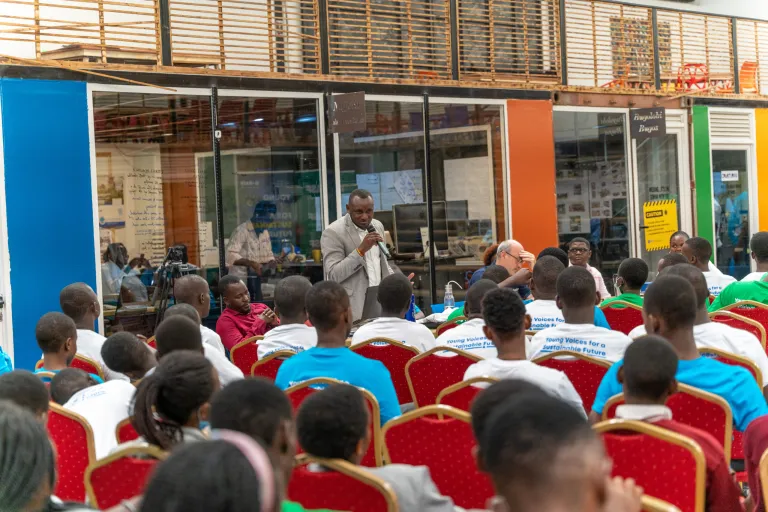By Vanessa Kyalimpa
Chasing birds away each morning when they came to eat the grains on the ears of the ripe sorghum has been a typical role for any young boy in Kabale, a district in Western Uganda. Such is one memory of the Rev. Prof. Manuel Muranga, a Kabale-born lecturer at the Institute of Language Studies, Kabale University.
“It was our culture,” Rev. Muranga recalls of people known as Bakiga. “We called it ‘okubinga enyonyi,’ meaning keeping the birds away, which wasn’t a nice exercise because it required you to be up very early in the morning.”
At that, Muranga adds, the unwelcomed boyhood task increased his awareness of the importance of sorghum. It was, he said “our identity.”

In Kabale, the sorghum seed used for human cereal and for pasture animals, has been the number one crop grown by over 95% of households. It has not only been food for the community, but also a crucial ingredient for brewing “enturire,” a local, delicacy drink made from sorghum and honey and traditionally given to visitors as a sign of hospitality.
This once Kabale delicacy, along with its economic support, is diminishing.
Climate change – namely temperature and water excess or depletion patterns – is to blame, according to Alex Taremwa, a digital journalist and alum of Uganda Christian University (UCU). Together with Shemei Agabo, a Kampala-based multi-media storyteller, Taremwa helped produce a documentary entitled “Enturire” that gives this Uganda agriculture example of what happens to food and people when humans don’t take care of the environment. In short, abuse of carbon (i.e., fuel) pollutes the earth.
The film, possible because of a grant from the Embassy of France, reminds the viewer that while the least industrialized nations like Uganda emit the least carbon, they continue to be impacted the most by climate crisis. In the case of sorghum, it is the world’s fifth most important cereal after wheat, Africa’s second most important cereal crop after maize, and the third most important staple cereal food crop in Uganda and number one in Kabale District.
The documentary accentuates the impact on thousands with a focus on the lives of Mrs. Million Oworinawe, a Kabale sorghum farmer, and Mrs. Alice Asiimwe, a businesswoman. Both have made enturire their livelihood for over 30 years but are coming to the frightening reality that they soon will be unemployed because the harsh climate is rapidly destroying the sorghum quality.
“Growing up in a family of farmers made me see how profitable sorghum was,” Milion Orinawe recalls. “I used to plant sorghum on a quarter an acre of land and get about 300 kgs (661 pounds) of sorghum when I harvested. The harvest was very bountiful.”
In 2022, Orinawe gets as little as 50kgs (110 pounds) from her garden. She has since moved into Irish potato and maize growing as alternatives.
“More than 90% of the households in Kabale District are finding it harder to grow sorghum – the most grown cereal in Kigezi Sub-region,” Taremwa, a co-founder of Last Drop Africa, a climate change activism not-for-profit, notes in an article that appeared in the Daily Monitor newspaper. “As a result, sorghum production has nosedived.”
This plummet affects incomes of hundreds of farmers, especially women, according to the 2022 Kabale District’s Third Development Plan (2020-2025).
The documentary shows that while the developing nations such as Uganda emit the least carbon, they continue to suffer the biggest effects of the climate change crisis.
Kabale, which was known for chilly weather is now suffering from, “unpredictable rains and rising temperatures,” as captured in the opening statements of the nearly 18-minute documentary.
“In the old times, a farmer would know that by a specific month on a certain day, rains would come, so they would do the early planting,” says Deus Bagambana Baguma, a principal agricultural officer in Kabale. “But now, they have to wait for the rains to first come in order for them to plant and it could stop after a few days. This really affects how the crops come up and how many farmers grow the crop. In fact, now farmers have resorted to doing other things.”
Dr. Richard Edema, director for Makerere University Regional Centre for Crop Improvement (MARCCI), notes that the Kabale hills are warming up, a happening that has reduced the rain and increased the incidences of pests and diseases.
“There are a variety of things that are alleged to be causing this but you cannot deny the change in weather in these places,” Dr. Edema said. “The weathers of Kabale that used to suit the growing of these crops have changed which also affects the performance of these crops.”
While food scientists and agronomists scratch their heads for solutions, such media as Taremwa’s are helpful to create awareness about the dangers of climate change that touch the daily life elements, such as a drink inside a cup.


